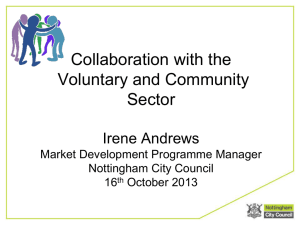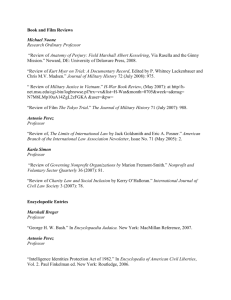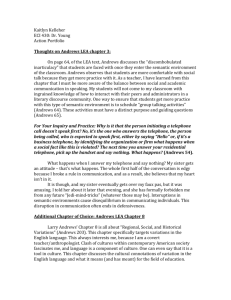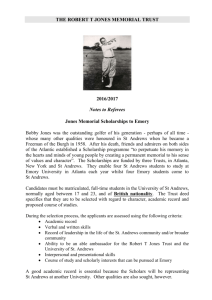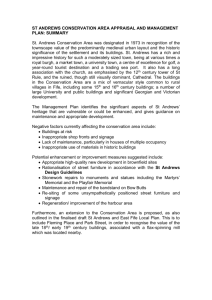Richard Andrews`s Biosketch - UNC Gillings School of Global Public
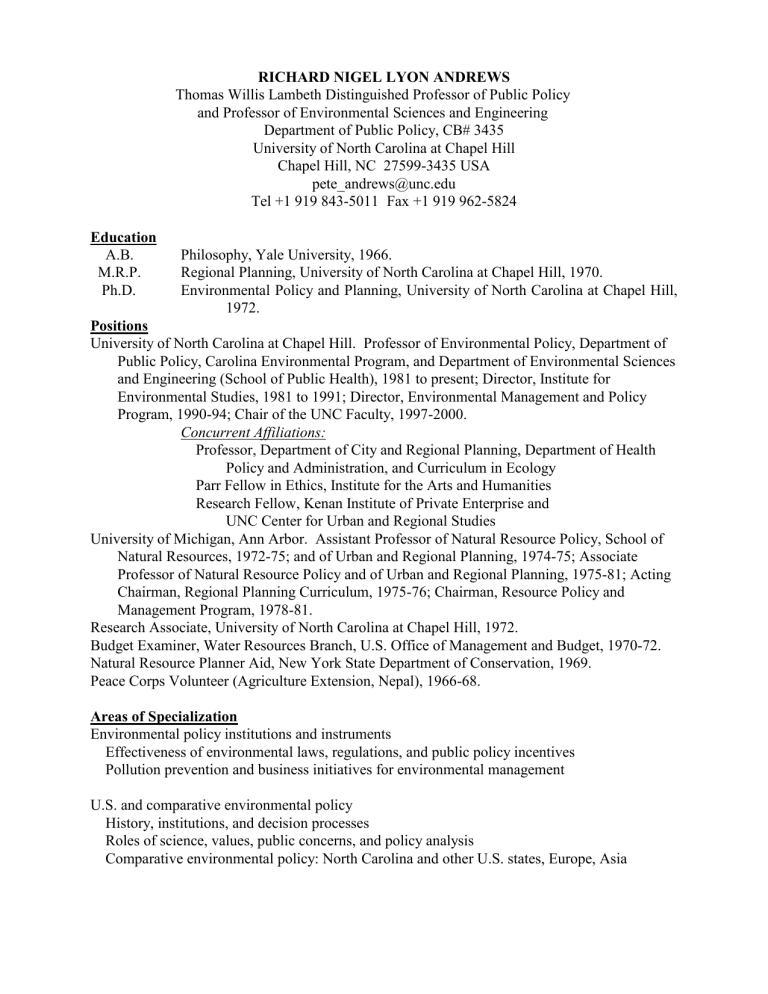
RICHARD NIGEL LYON ANDREWS
Thomas Willis Lambeth Distinguished Professor of Public Policy and Professor of Environmental Sciences and Engineering
Department of Public Policy, CB# 3435
University of North Carolina at Chapel Hill
Chapel Hill, NC 27599-3435 USA pete_andrews@unc.edu
Tel +1 919 843-5011 Fax +1 919 962-5824
Education
A.B.
M.R.P.
Philosophy, Yale University, 1966.
Regional Planning, University of North Carolina at Chapel Hill, 1970.
Ph.D. Environmental Policy and Planning, University of North Carolina at Chapel Hill,
1972.
Positions
University of North Carolina at Chapel Hill. Professor of Environmental Policy, Department of
Public Policy, Carolina Environmental Program, and Department of Environmental Sciences and Engineering (School of Public Health), 1981 to present; Director, Institute for
Environmental Studies, 1981 to 1991; Director, Environmental Management and Policy
Program, 1990-94; Chair of the UNC Faculty, 1997-2000.
Concurrent Affiliations:
Professor, Department of City and Regional Planning, Department of Health
Policy and Administration, and Curriculum in Ecology
Parr Fellow in Ethics, Institute for the Arts and Humanities
Research Fellow, Kenan Institute of Private Enterprise and
UNC Center for Urban and Regional Studies
University of Michigan, Ann Arbor. Assistant Professor of Natural Resource Policy, School of
Natural Resources, 1972-75; and of Urban and Regional Planning, 1974-75; Associate
Professor of Natural Resource Policy and of Urban and Regional Planning, 1975-81; Acting
Chairman, Regional Planning Curriculum, 1975-76; Chairman, Resource Policy and
Management Program, 1978-81.
Research Associate, University of North Carolina at Chapel Hill, 1972.
Budget Examiner, Water Resources Branch, U.S. Office of Management and Budget, 1970-72.
Natural Resource Planner Aid, New York State Department of Conservation, 1969.
Peace Corps Volunteer (Agriculture Extension, Nepal), 1966-68.
Areas of Specialization
Environmental policy institutions and instruments
Effectiveness of environmental laws, regulations, and public policy incentives
Pollution prevention and business initiatives for environmental management
U.S. and comparative environmental policy
History, institutions, and decision processes
Roles of science, values, public concerns, and policy analysis
Comparative environmental policy: North Carolina and other U.S. states, Europe, Asia
Honors
Thomas Willis Lambeth Distinguished Professorship in Public Policy (2004)
Most Outstanding Faculty Award, Public Policy Majors Union (2004)
University Distinguished Service Research Leave (2000-01)
Parr Fellow in Ethics, UNC Institute for the Arts and Humanities (2000)
Innovations Award, Council of State Governments (1998)
(shared award, as a member of the Multi-State Working Group on
Environmental Management Systems)
Fellow, National Academy of Public Administration (elected 1996)
Fellow, American Association for the Advancement of Science (elected 1992)
Fulbright Fellow and Guest Professor, Vienna University of Economics (1990)
Sigma Xi (elected 1989)
Delta Omega Public Health Honorary Society (elected 1983)
Rockefeller Fellow in Environmental Affairs (1977-78)
Resources for the Future Dissertation Fellow (1971-72)
Mellon Fellow (1970-71)
NIH Environmental Health Fellow (1969-71)
Professional Activities (partial listing)
Member, Committee on the Human Dimensions of Global Change, National Research Council,
2005- .
Member, Panel on Environmental Decision Making, National Research Council, 2003-05.
Chair, Panel on U.S. Registration Practices for ISO 14001 Environmental Management
Systems, National Academy of Public Administration, 2000-01.
Member, Committee on Science, Engineering, and Public Policy, American Association for the Advancement of Science, 1997-2003.
Member, Advisory Panel on Setting Priorities: New Directions for the Environmental
Protection Agency, National Academy of Public Administration, 1994-95.
Chair, Advisory Committee on Rethinking Environmental Regulation, U. S. Congress Office of Technology Assessment, 1993-95.
Member, Strategic Options Subcommittee, Relative Risk Reduction Strategies Committee,
U.S. EPA Science Advisory Board, 1989-90.
Chair, Section on Societal Impacts of Science and Engineering, American Association for the
Advancement of Science, 1989-90, 1996-97; Nominating Committee Member, 1988-89;
Annual Meeting Program Committee, 1988-90; Member, Committee on Science,
Engineering, and Public Policy (COSEPP), 1997-2003; Section Committee Member-at-
Large, Section on Social, Economic, and Political Sciences, 1998-2001.
Member, Board on Environmental Studies and Toxicology, National Academy of Sciences,
1986-88; Chair, NAS Study Committee on Opportunities in Applied Environmental
Research and Development, 1988-91.
Trustee, The Institute of Ecology (Indianapolis, Indiana), 1977-82.
Expert witness on implementation of NEPA. U.S. Council on Environmental Quality, 1977.
Expert witness on performance of U.S. Council on Environmental Quality. U.S. Senate
Committee on Interior and Insular Affairs, 1976.
State Service
2
Member, Environmental Stewardship Advisory Committee, North Carolina Department of
Environment and Natural Resources, 2002-2005.
Advisor, Division of Pollution Prevention and Environmental Assistance, North Carolina
Department of Environment and Natural Resources, 1995-2003.
Member, North Carolina State Solid Waste Plan Advisory Committee, 1991.
Member, Committee on Air Toxics, North Carolina Academy of Sciences, 1986.
Member, Natural Heritage Advisory Committee, North Carolina Department of Natural
Resources and Community Development, 1983-87.
Member, Pollution Prevention Research Advisory Committee, North Carolina Board of
Science and Technology, 1983-88.
Senior staff member, Governor’s Commission on the Future of North Carolina (“NC 2000” report: chief staff member, Natural Resources Panel), 1982-84.
Research Grants (partial listing)
U. S. Environmental Protection Agency (2001-05). Environmental Management Systems: Do
Formalized Management Systems Produce Superior Performance?
U. S.-Asia Environmental Partnership (2000-05). Environmental Policy in the Global
Economy. (with Kenan Institute of Private Enterprise and Kenan Institute Asia).
U. S. Environmental Protection Agency (1997-2003). Effects of ISO 14001 Environmental
Management Systems (with John Villani and Deborah Amaral, Department of Public
Policy) .
U. S. Environmental Protection Agency (1996-99). Effectiveness of Regulatory Incentives for
Sediment Pollution Prevention (with Seth Reice, Curriculum in Ecology).
U. S. Environmental Protection Agency (1995-97). Policy Innovations for Permitting
Innovative Technologies (with John Villani, Curriculum in Public Policy Analysis) .
U. S. Information Agency (1992-96). Fulbright University Affiliation Program in
Environmental Policy and Economics (among UNC and Sofia and Vienna Universities of Economics).
U. S. Agency for International Development (1991-95): Economic Approaches to
Environmental Policy in Czechoslovakia.
Selected Publications
Andrews, R. N. L. 2006 (forthcoming) . Managing the Environment,. Managing Ourselves: A
History of American Environmental Policy. 2nd ed. New Haven: Yale University Press.
Andrews, R. N. L.; Hutson, Andrew M.; and Daniel Edwards, Jr. 2006 ( forthcoming ).
Environmental Management Under Pressure: How Do Mandates Affect Performance?
Chapter 5 in Leveraging the Private Sector: Management Strategies for Environmental
Performance, edited by Cary Coglianese and Jennifer Nash. Washington, DC: Resources for the Future Press.
Andrews, R. N. L. 2005. Recovering the Environmental Legacy of FDR. Chapter 10 in FDR and the Environment, edited by Henry L. Henderson and David B. Woolner. New York:
St. Martin’s Press.
Andrews, R. N. L. 2004. The Environment in Business Decision Making. Chapter 4 in
Decision Making for the Environment: Social and Behavioral Science Research
Priorities, Report of the Panel on Social and Behavioral Science Research Priorities for
3
Environmental Decision Making, Committee on the Human Dimensions of Global
Change, National Research Council. Washington, DC: National Academy Press, pp. 52-
68.
Gallagher, D. R.; Andrews, R. N. L.; Chandrachai, Achara; and Kaewta Rohitratana. 2004.
Environmental Management Systems in the U.S. and Thailand: A Case Comparison.
Greener Management International, vol. 46, pp. 41-56.
Darnall, Nicole; Gallagher, Deborah Rigling; and R. N. L. Andrews. 2002. Environmental
Management Systems: The Changing Landscape of Manufacturing and Operations. Chapter
12 in Greener Manufacturing and Operations, edited by Joseph Sarkis. Sheffield, England:
Greenleaf Publishing.
Andrews, R. N. L. 2002. Risk-Based Decision Making. Chapter 10 in Environmental Policy:
New Directions for the Twenty-first Century, edited by Norman Vig and Michael Kraft.
Washington, DC: Congressional Quarterly Press, 5th edition.
Andrews, R. N. L. et al. 2001. Environmental Management Systems: History, Theory, and
Implementation Research. Chapter 2 in Regulating from the Inside: Can Environmental
Management Systems Achieve Policy Goals?, edited by Cary Coglianese and Jennifer Nash.
Washington, DC: Resources for the Future Press.
Andrews, R. N. L., et al. 2001. Lessons from OECD Experience With Voluntary Approaches.
Chapter 1.2 in Voluntary Agreements in Environmental Policy, edited by Petr Sauer et al .
Prague: University of Economics Prague. ISBN 80-245-0117-1.
Eggers, Dolores M.; Villani, John; and Richard N. L. Andrews. 2000. Third-Party
Information Providers and Innovative Environmental Technology Adoption. American
Behavioral Scientist, vol. 44, no. 2, pp. 266-77.
Andrews, R. N. L. 2000. Experience With Voluntary Approaches in Environmental Policy
Abroad: the United States. Chapter 4.2 in Dobrovolne Dohody V Politice Zivotniho
Prostredi [Voluntary Agreements in Environmental Policy], edited by Petr Sauer et al.
Prague: University of Economics Prague. ISBN 80-245-0116-3.
Andrews, R. N. L. 1999. Managing the Environment,. Managing Ourselves: A History of
American Environmental Policy. New Haven: Yale University Press. 416 pp.
Andrews, R. N. L. 1998. Environmental Regulation and Business “Self-Regulation.” Policy
Sciences, v. 31, no. 3, pp. 177-97.
Andrews, R. N. L. 1993. Long-Range Planning in Environmental and Health Regulatory
Agencies. Ecology Law Quarterly 20(3):515-582.
Andrews, R. N. L. 1984. Economics and Environmental Decisions, Past and Present.
Chapter 2 in Environmental Policy Under Reagan’s Executive Order: The Role of
Benefit-Cost Analysis, edited by V. Kerry Smith. Chapel Hill: University of North
Carolina Press.
Andrews, R. N. L. 1982. Cost-Benefit Analysis as Regulatory Reform. Chapter 6 in Cost-
Benefit Analysis and Environmental Regulations: Politics, Ethics, and Methods, edited by Daniel Swartzman, Richard. Liroff, and Kenneth Croke. Washington, DC: The
Conservation Foundation.
Andrews, R. N. L. 1976. Agency Responses to NEPA: A Comparison and Implications.
Natural Resources Journal, Vol. 16, No. 2, April 1976, pp. 301-322. Reprinted in C.
Kury (ed.), Enclosing the Environment: NEPA’s Transformation of Conservation into
Environmentalism (Albuquerque, NM: University of New Mexico School of Law,
1985), Twenty-fifth Anniversary Anthology of Natural Resources Journal.
4
Andrews, R. N. L. 1976. NEPA in Practice: Environmental Policy or Administrative
Reform? Environmental Law Reporter 6:50001-09.
Andrews, R. N. L. 1976. Environmental Policy and Administrative Change: Implementation of the National Environmental Policy Act. Lexington, MA: Lexington Books, D.C.
Heath and Co. 230 pp.
February 2006
5

